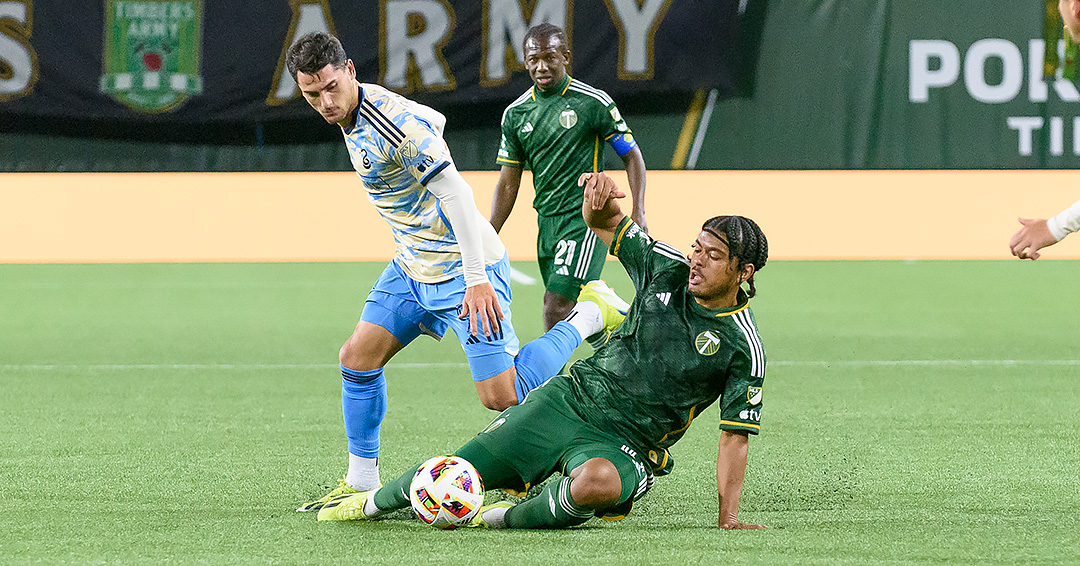The fun is over. The Portland Timbers are officially just as frustrating as they were last season.
Just when we thought Portland did a 180° turn… the last three games were as if reality slapped fans in the face.
“Unacceptable”
In the first Cascadia derby match of the year, Timbers head coach Phil Neville’s squad went down 0-1 only 90 seconds into the match. “I felt that the first 30 minutes were totally unacceptable for a derby game,” Neville said. “You don’t start a derby game like that, going down in the first 90 seconds.”
It’s the same old story: The Timbers look like a world-class team one minute and then look like clowns the next.
On the flipside, the first goal Portland scored was stunning. It’s an example of how the Timbers can play in every game. Those guys have a nag for shooting themselves in the foot, and they showed that outstanding ability again in this game.
Look at the buildup: Cristhian Paredes not only occupied the half space well, but Jonathan Rodríguez did well distracting defenders, which helped Evander stay unmarked at the edge of the box. The positioning also gave Evander enough space and time to produce a world-class finish, one that was almost impossible to stop.
So, the question is: How can the Timbers look that good and then play like complete amateurs?
“You can’t […] concede three goals and expect to win games“
We’ll rephrase coach Neville and point out the way those three goals were scored. Of course, the Vancouver Whitecaps deserve some recognition for finishing them, but we cannot help but think the Timbers contribute a lot to those goals. Heck, they should even get part of the expected goal credit!
In the first one, Ryan Gauld entered the box through the half-space, while Diego Chará failed to track him. Then, Zac McGraw couldn’t clear the ball, and the rebound fell to Gauld’s feet. The forward finished with a shot to the near post that beat Maxime Crépeau.
It didn’t take the Whitecaps much hassle—only four passes on the right wing, in fact—to get to the Timbers’ box for the second goal. Well, that and McGraw’s backheel assist.
For the third… well, Crépeau couldn’t hold the ball, and then Portland’s entire defense forgot to watch their backs, making it too easy for Ryan Raposo to get into the box and hit that ball home.
So, if we rephrase the coach, we would say, “You can’t […] concede three goals in that way and expect to win games.”
Do they know how to build from the back?
Correct me if I’m wrong, but many times it looked as if the Timbers didn’t have a clue about what to do with the ball when trying to build from the back. When Crépeau sent the ball to his centerbacks instead of sending a long pass, the defenders moved the ball here and there, but they had serious issues with the progressive phase.
Actually, that’s what led to Vancouver’s second goal. If we rewatch the tape, we’ll see that after six passes, McGraw tried to send the ball to the midfield where Rodríguez was, but it was blocked. Vancouver took advantage of the interception to regain possession, switched the point of attack, and ended up scoring.
We know the Timbers have more often than not played direct in the past and felt more comfortable being in the back seat regarding possession. They’re used to forcing errors and then going fast in counterattacks. But in this match, it was different.
Vancouver let Portland press in the final 20 minutes of the first half, and then the Timbers took the main seat in the second half. Evander grew exponentially—and he was everywhere, scoring and assisting.
They were things of beauty, his finish and his assist. But no magic designated player can save a team that has serious lapses in defense. As we already established, the three goals scored by Vancouver were preventable if Portland’s defense had stayed organized. And as long as the Timbers can’t get their defense together, no designated player will save them.
Going back to build up, the Timbers need to learn to feel comfortable with their ball at their feet. They need to learn how to build from the back and use the midfield properly. It is true that Chará might not be the same as he has been in seasons past—age is taking its toll—but the team has a true creator in Evander, and Santiago Moreno can be his partner in crime in that midfield.
Speaking of Moreno, he needs to get his act together. He did well against Vancouver, staying high to steal balls and always staying connected to the game, but he needs to connect better with his teammates in the attack to make chances count.
The Timbers will play again on Sunday, this time against Sporting KC. If they want to get at least a point on the road, they need to stop gifting the ball to their opponents, and they need to stop doing that in dangerous positions.
It finally looks as if the attack won’t be a problem this season, but who cares if the team can score beautiful goals if the coach has to sub one of the centerbacks out at halftime due to a very poor performance among other serious defensive problems?

